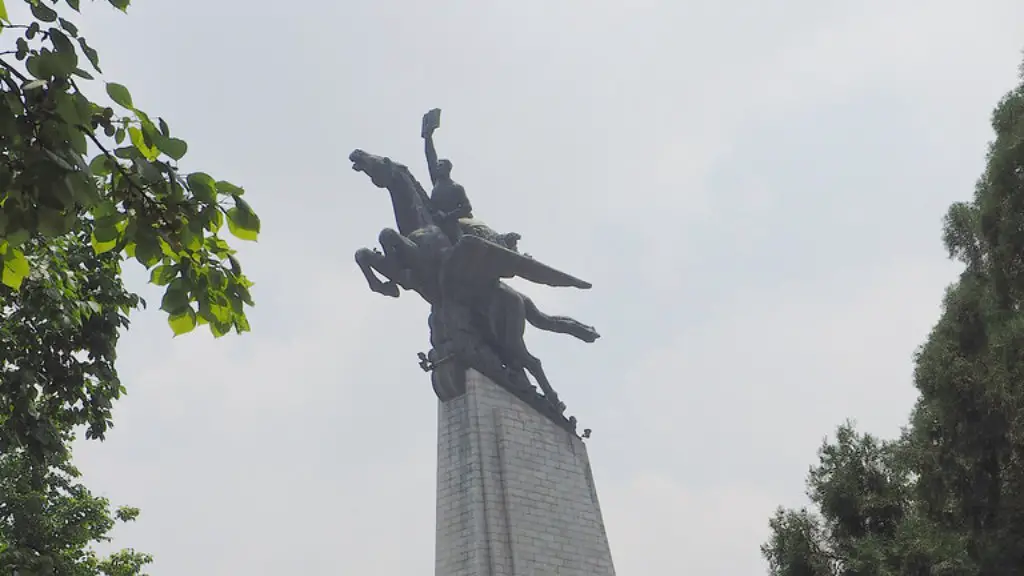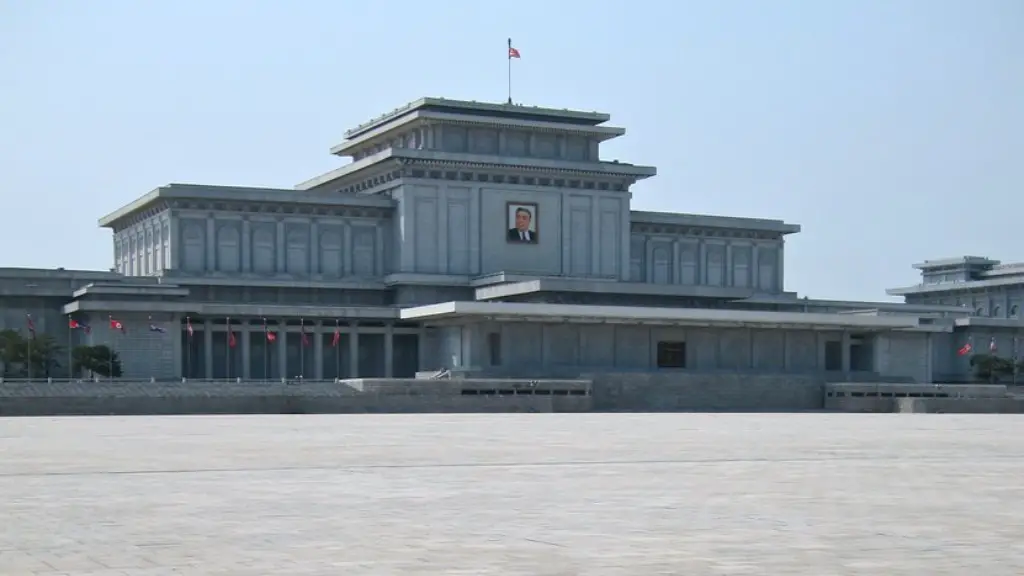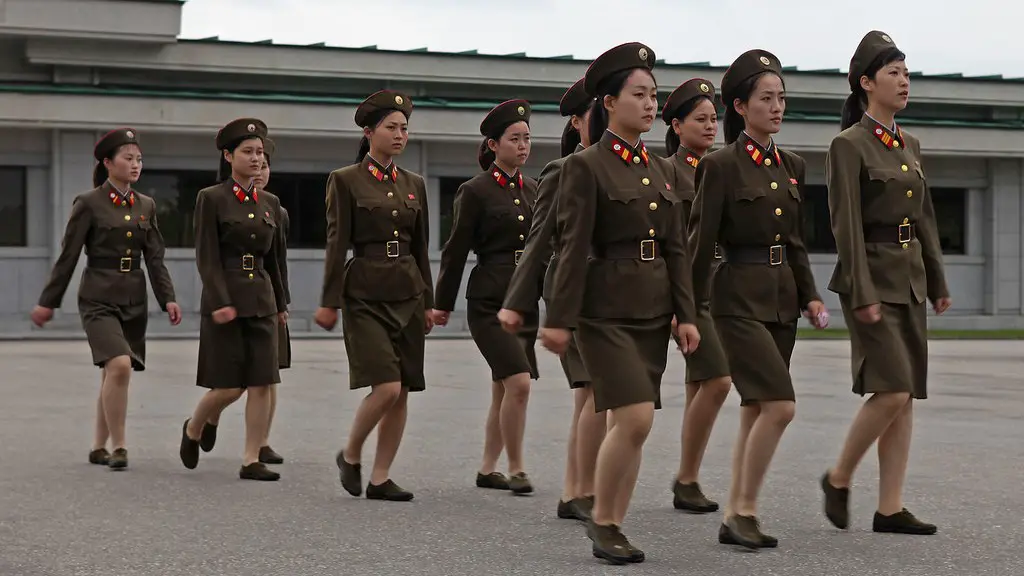North Korea is a political enigma: a closed-off, totalitarian state unlike any other in today’s world. While, many people know that this reclusive nation is run by the Kim dynasty, what type of government is North Korea actually under?
Officially, the Democratic People’s Republic of Korea (DPRK) is a single-party state under the rule of the Korean Workers’ Party (KWP). Established in 1948, KWP bases itself upon Marxist-Leninist principles of Socialism, as dictated by it’s founder, Kim Il-sung. These principles are inextricably linked to the North Korean Juche philosophy, in which ‘the master of everything is man’ or, more specifically, the Kim dynasty.
At the head of the government stands Kim Jung Un, the de facto leader and direct descendant of his predecessors. He is backed by a dedicated core of political elites, and the vast majority of government institutions and bureaus. The state is subject to total oversight from the Kim regime, from education and the media, to the military and day-to-day life.
This system is designed for maximum efficiency, with every aspect of state governance and culture subordinated to the leadership of the KWP. Making up the laws of DPRK is a single document, the ‘Socialist Constitution of the DPRK’. This document outlines the state’s core ideologies and principles, which are strictly followed and enforced by the government.
Discrepancies within the state’s political system arise in the areas of popular representation and decentralization. With the state’s firm commitment to a unitary government system and near-absolute control over the populace, no substantial representation exists above the local level. A further point of contention is the lack of economic decentralization among state institutions, with the majority of North Korea’s economy tightly regulated by the Kim dynasty.
The nature of North Korea’s government presents both drawbacks and benefits. Residents of the nation have little to no representation in the government, with the Kim dynasty exercising almost absolute control over the nation’s population. This fact reinforces the risk of public uprisings or civil unrest, as citizens have few means of voicing their discontent.
On the other hand, the North Korean government remains a notably stable entity when compared to other nations, and with supreme control over the population and its resources, the state is able to exert powerful effects on the nation’s economic and social culture.
Life Under A Centralized Government
Life in a state governed by an authoritarian regime may seem frightening and oppressive to those living in more democratic countries. This is because the state’s control over its citizens is vast, leading to intense surveillance and censorship of the nation’s activities. The centralization of decision-making also means that little to no outside input is considered when crafting policy and regulations.
The government has also taken extensive measures to impede the communication and access to information from outside sources. Mobile phones and internet access are strictly prohibited without special permission from the state, and even then, those that are permitted are limited to a single, heavily monitored and censored server.
This has prompted an increased international concern for the citizens of North Korea, who are generally cut off from the rest of the world. North Korea does not allow any non-state organizations to operate within its borders, and international contact is almost non-existent.
Despite the obvious restrictions and oppressive atmosphere in North Korea under centralized rule, many citizens remain loyal to the Kim dynasty. Propaganda and patriotism are used to imbue citizens with feelings of loyalty and admiration for their leader, and on the whole, most citizens continue to remain supportive of their government.
Economic Effects of Centralized Government
Due to its reliance on authoritarian rule and centrality, North Korea’s economic system has become heavily reliant on the state’s control over its resources. As with many other totalitarian nations, government control of the economy is absolute, with the state controlling all aspects of the nation’s production, from agriculture and industry to resource extraction and transportation.
The state’s centralization of the economy has had several beneficial effects on North Korea’s development, as the government can easily implement policy and ensure its implementation with minimal interference. The centralization of resources has also made it easier for the government to target investment and production into strategic areas, leading to significant economic growth in select sectors.
Unfortunately, the main downside of the nation’s heavily centralized economy is the lack of economic freedom enjoyed by its citizens. The Kim dynasty has absolute control over the nation’s resources, and this power has enabled states to maintain a tight grip over businesses and citizens alike.
Furthermore, without autonomous private enterprise, citizens are unable to pursue their own investments and businesses. As a result, most citizens are employed and dependent upon the state for their income and day-to-day needs.
Political Effects of Centralized Government
The nature of North Korea’s government has also had a significant effect on the nation’s wider political climate. As the Kim dynasty holds absolute control over the nation’s population, state policies are strictly enforced and dissent is swiftly and harshly punished.
In addition, the state actively censors most of the nation’s media and information sources, ensuring that only official, state-approved stories are propagated within the nation. This form of censorship has also restricted the ability of citizens to express themselves, with any form of political criticism or protest being swiftly silenced.
The state’s control over its population has also hindered the nation’s ability to form relationships with other nations. As North Korea is often seen as an oppressive state, its nation’s border is rarely opened to foreign nations, limiting the state’s ability to engage in the international arena.
While the state’s total control over its citizens does present considerable drawbacks, North Korea’s government has also enabled much stability. As dissent is rarely tolerated, any potential threats to the government’s rule are quickly quashed, resulting in relative stability within the nation.
Human Rights In North Korea
Perhaps the most concerning element of North Korea’s totalitarian government is its dismal record with regards to the protection of human rights. The state maintains tight control over its citizens and has shown little regard for international concerns over human rights, often disregarding calls for reform or access to the nation’s prisons and labor camps.
Furthermore, the state’s own institutions are poorly equipped to handle any legal complaints, with all criminal proceedings decided by the state itself. Citizens are also denied contact with free legal counsel, often resulting in unfair trials, lengthy prison sentences, and even executions.
Religious freedom is also heavily restricted in the nation, and any kind of religious gatherings and worship is generally prohibited, often leading to persecution of clergy and members of religious organizations.
The oppressive atmosphere of life in North Korea has also had a significant impact on the mental and physical wellbeing of the nation’s citizens. The state’s lack of resources, combined with its oppressive surveillance and harsh punishments, have resulted in poor living conditions for much of the nation’s population.
International Pressure On North Korea
In light of North Korea’s human rights abuses, much of the international community has enacted several sanctions against the nation and its government. These include sanctions on the country’s economy and military, as well as restrictions on certain individuals and businesses affiliated with the nation.
In addition, many nations have imposed economic restrictions, such as cutting trade relations or limiting the amount of assistance that can be given to the nation. The US has also imposed secondary sanctions to target international companies that conduct business with North Korea.
These sanctions have had a substantial impact on the nation, resulting in decreased foreign investment, disrupted trade, and limited access to resources.
The international community has also pushed for the implementation of the United Nations Human Rights Council’s Universal Periodic Review (UPR) of the nation. The UPR is the UN’s main mechanism for monitoring the status of human rights in all countries, and by participating, North Korea would be obliged to open dialogue with the international community on its human rights record.
International Negotiations with North Korea
In recent years, several notable international negotiations have taken place between North Korea and its various international partners, such as the US and South Korea. These talks have centered on denuclearization, with the goal of dissuading North Korea from its nuclear weapons program.
This agreement, known as the ‘Six Party Talks’, or the Joint Statement of the Six-Party Talks, was a joint statement signed by North Korea, the US, China, Japan, Russia and South Korea to collaborate on peace and denuclearization in the Korean peninsula.
The talks have made significant headway, with North Korea taking notable steps to reduce its stockpile of nuclear materials and weapons. However, the talks have stalled in recent years, largely due to the unstable nature of North Korea’s government and its reluctance to take steps towards full denuclearization.
North Korea and the International Community
North Korea’s relationship with the international community is one of mistrust and trepidation. The nation’s reputation as a totalitarian state, along with its dismal record on human rights and its pursuit of nuclear weapons, has raised significant international concern.
Despite its strict authoritarian rule, North Korea remains a powerful political presence, with significant economic ties to China, and limited diplomatic relations with most other nations. Its nuclear arsenal, although a source of great concern, has provided the nation with a level of deterrence and power that has kept it from becoming a total international pariah.
The international community’s relationship with North Korea is complicated, as most nations are eager to see the nation open up to the world and reform its government. However, many see North Korea’s unwillingness to negotiate and its continued human rights abuses as a barrier to these reforms.
Moving Forward In North Korea
So, what does the future hold for North Korea? Despite its grim social and political atmosphere, hope remains in the form of change from within and from the international community. The nation’s current centralized government has undoubtedly oppressed its citizens and hindered its global relations, however, this may all change in the coming years.
The nation has opened its borders to a select few, allowing more direct access to the outside world and more opportunities for citizens to voice their discontent. In addition, international sanctions may eventually pressure the Kim dynasty to become more lenient and to open up to the international community.
The international community has also increased its pressure on North Korea, enacting tougher sanctions and pressuring the nation to cease its nuclear weapons program. The UN has also imposed the Universal Periodic Review, giving it more insight into the state of the nation’s human rights.
Ultimately, North Korea’s future remains uncertain. Only time will tell if the nation’s government will be able to respond to the pressures and challenges of the modern world, and what path the Kim dynasty may take in the coming





